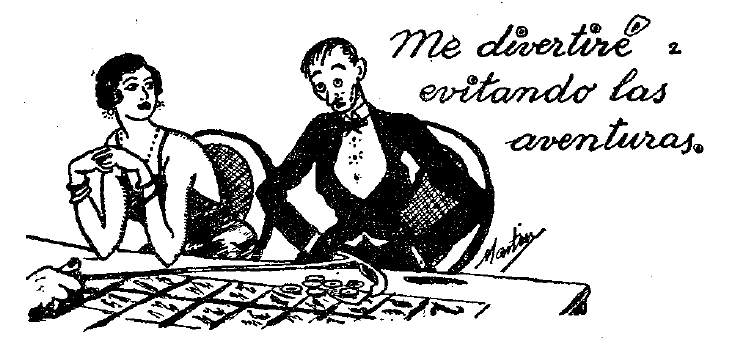
| Языки :: Испанский |
| Аудио |

 |
|
 |
|
10 |
Español |
Spanish |
| Lectura Segunda (2ͣ)) | ||
| Alberto va a París (fin) | Albert goes to Paris (end) | |
| Fin is sounded feenn and means end (final). | ||
| Before studying this lesson, repeat aloud the previous one. | ||
| 1 | Hombre! te envidio, y espero que todo ira bien. | Oh! [man], (I) envy you and hope that all will go well. |
|
Hombre, man, is used as an exclamation, marking surprise
or admiration. H is always mute in Spanish; v is almost b. |
||
| 2 |
¿Por qué no? ¿Qué te figuras? |
Why [for what] not? What (do you) imagine? |
| 3 |
¿Qué sé yo? La vida de Paris es tan animada. |
What (do) I know? [The] life in [of] Paris is so animated! |
| 4 | No te preocupes; yo viviré tranquilo; me divertiré, evitando las aventuras. |
Never mind! [Do not preoccupy yourself] ; I shall live tranquilly; I shall divert myself avoiding [the] adventures. |
|
Note that qui, as in tranquilo, is pronounced kee. If, according to the Spanish Academy, the v and b are two distinct letters, in practice they are always mixed up. People pronounce neither b nor v, but a slack sound between the two and generally much nearer the b. So, pronounce la vida, yo viviré, evitando, aventuras, as if v's were b's, only articulated very softly, by drawing the lips together without joining them. And, indeed, don't take too much trouble, for you will be perfectly understood if you pronounce the v's in the English way; but this pronunciation is in Spanish somewhat pedantic, and pretentious, and should he "aboided" Allow for this observation when repeating the lesson, sentence after sentence, exactly as we indicated for the previous one. It is agreed that you will be content to understand, without trying to explain the verbal forms, or the phrases that differ from the English ones. |
